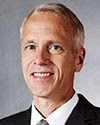Nobel Laureate Brian Kobilka, MD, and NASA Astronaut Jessica Meir, PhD, are among the highlighted speakers who will attend the American Physiology Summit, the American Physiological Society’s (APS) flagship annual meeting. The Summit will be held April 4–7, 2024, in Long Beach, California.

Image Credit: American Physiological Society
Nobel Laureate Brian Kobilka, MD, is a professor and chair of molecular and cellular physiology at Stanford University School of Medicine in Palo Alto, California. Together with his colleague Robert Lefkowitz, MD, Kobilka won the 2012 Nobel Prize in Chemistry for their work on G-protein-coupled receptors. Kobilka will give the Summit’s opening keynote talk, “Challenges and new approaches to drug discovery for G protein coupled receptors,” on Thursday, April 4, at 4:15 p.m. PDT. Read more about Kobilka.
NASA Astronaut Jessica Meir, PhD, assistant to the chief astronaut for Commercial Crew (SpaceX) and deputy for the Flight Integration Division, trained as a comparative physiologist before becoming an astronaut. From 2019 to 2020, she spent 205 days living and conducting scientific experiments on the International Space Station. Meir will give the closing keynote talk, “The Physiology of Space Flight,” on Sunday, April 7, at 11:30 a.m. PDT. Read more about Meir.
The meeting’s lineup will also feature eight game-changer sessions highlighting some of the biggest topics affecting life and health today. Top scientists from around the world will discuss these vital issues.
The game-changer sessions are:
The Molecular Circadian Clock: Understanding Its Role in Homeostasis
Cutting-edge advances in understanding molecular circadian clocks and how circadian rhythm function is integrated across physiological systems to maintain homeostasis
AI Unbound: Challenging Scientific Boundaries in Physiology Research and Data Science
How advances in technology, artificial intelligence, machine learning and deep learning are pushing boundaries in science and health care
G Protein-coupled Receptors as Drug Targets: Novel Insights and New Approaches
G protein-coupled receptor (GPCR) application as drug targets and approaches in identifying GPCR-regulating proteins in the cardiovascular system
Harnessing the Power of Spatial Omics: Innovative Approaches and Insights into Cell Function
Novel insights into cell function in systems biology and how cells organize and interact across the tissue landscape to drive disease progression
Interorgan Crosstalk: Exploring Communication Axes and Their Relevance in Health and Disease
New epidemiological and pre-clinical evidence that highlights the relevance of interorgan crosstalk in homeostasis and disease
Cognitive Decline: Collateral Damage of Cardiometabolic Syndrome
New findings that could prompt preventive and counteractive remedies for the loss of cognitive function in people with obesity and metabolic syndrome
Immunometabolism: At the Crossroads of Novel Gut-Neural-Cardiorenal Pathophysiological Mechanisms of Disease
An exploration of basic applied and clinical science in diverse animal and human models, including underrepresented populations, and an introduction to immunology from an integrative physiological perspective
Physiology in Nontraditional Model Systems: Exploring Species Diversity to Reveal Adaptations with Translational Potential
The study of nontraditional models for mechanisms of unique adaptations that can enhance understanding of how other species respond to internal and external physiological challenges
Explore the Summit’s schedule at a glance and program by day.